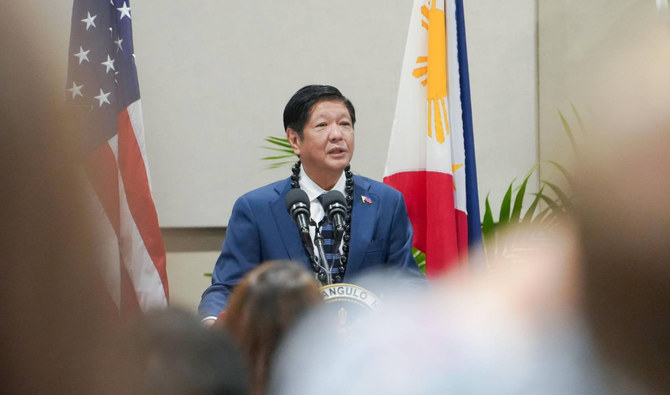MANILA: The Philippines has started negotiating for a separate code of conduct regarding the South China Sea with neighboring countries like Vietnam and Malaysia, its president said on Monday, citing slow progress toward striking a broader regional pact with China.
The Philippines and China have been locked in an ongoing territorial dispute in the resource-rich South China Sea, where other nations also have claims.
Tensions have been growing in the past year, with Manila and Beijing accusing each other over multiple incidents in the strategic waterway, including a collision between Chinese vessels and a Philippine Coast Guard ship last month.
Speaking at a livestreamed event in Hawaii, President Ferdinand Marcos Jr. said that the situation has become “more dire.”
The president said: “The increasing tensions in the South China Sea require that we partner with our allies and our friends around the world, so as to be able to come to some kind of a solution and to maintain the peace.
“We are now in the midst of negotiating our own code of conduct … because we are still waiting for the code of conduct between China and ASEAN, and the progress has been rather slow unfortunately,” he added, referring to efforts by the regional grouping of Southeast Asian nations.
“We have taken the initiative to approach those other countries around us and with whom we have existing territorial conflict — Vietnam being one, Malaysia being another — to make our own code of code of conduct, and hopefully this will grow further and extend into the other ASEAN countries.”
ASEAN and China agreed on guidelines to accelerate negotiations for a code of conduct in the South China Sea only in July this year, as discussions have languished for years.
Marcos’ statement followed his meeting on Friday with Chinese President Xi Jinping on the sidelines of the Asia-Pacific Economic Cooperation forum in San Francisco, where the two leaders discussed ways to reduce tensions in the South China Sea.
Don McLain Gill, an international studies lecturer at De La Salle University in Manila, said Southeast Asian countries have historically been more flexible “to compromise and negotiations between themselves.”
He told Arab News: “As key Southeast Asian states, they are also concerned about losing the legitimacy of ASEAN if infighting between the bloc continues to exacerbate.”
Negotiations between Southeast Asian states are therefore likely to be “prioritized and respected,” he added.
“This is in contrast to negotiations with China, which has been illustrating its expansionist interests in the South China Sea since 2008. China has now militarized the disputed maritime territory to its favor. Therefore, with China being at a clear advantage, it would be difficult to expect equitable and sustainable negotiations from Beijing.”
























